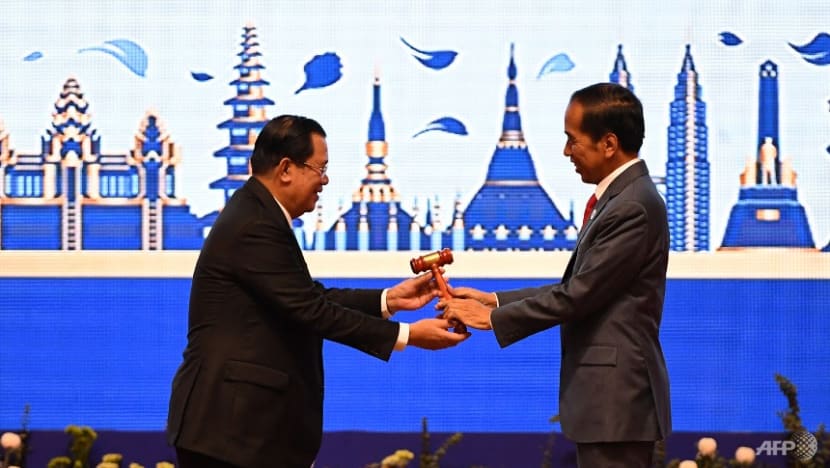EU to support Indonesia, next ASEAN chair, in addressing Myanmar situation: EU official
Leaders from Europe and Southeast Asia will gather at a special summit on Dec 14 in Brussels, Belgium to mark the 45th anniversary of diplomatic relations between the two regional blocs.

SINGAPORE: The pursuit of clean energy and upholding of a rules-based international order are key issues for European and Southeast Asian leaders, as the two blocs mark 45 years of diplomatic relations.
The connectivity between the two regions is another focus, said Mr Igor Driesmans, European Union (EU) ambassador to the Association of Southeast Asian Nations (ASEAN), on Wednesday (Dec 7).
He was speaking to CNA ahead of a special EU-ASEAN summit on Dec 14 in Brussels, Belgium to mark the milestone.
Mr Driesmans added that the EU will lend its support to Indonesia as it assumes the chairmanship of ASEAN next year. Issues on the horizon include addressing the situation in Myanmar.
CLEAN ENERGY TRANSITION AMONG KEY ISSUES
When European and Southeast Asian leaders meet in Brussels, there will be three key issues to discuss, said Mr Driesmans.
The first will be the transition to cleaner energy, something which is a “top priority in Europe”, said the ambassador.
“I think it's a good conversation to be had because we can only achieve climate neutrality if we're all in this together,” he said.
Mr Driesmans noted that climate change is “the biggest global challenge” now.
The EU will increase its investments in sustainable infrastructure in Southeast Asia, and hold more discussions at the political level on how to reduce carbon emissions.
Mr Driesmans noted that “without any significant decarbonisation, the energy-related CO2 emissions in ASEAN will double in the next 20 years”, underscoring the need for urgent action.
“We look forward to working with ASEAN in many different ways at a technical level (and) stepping up our expert exchanges,” he said, adding that a clean energy dialogue will be launched at the Brussels summit.
Secondly, the connectivity between Europe and Southeast Asia will be on the cards, with the two regions being each other’s third largest trading partner, said Mr Driesmans.
He added that there remains “a lot of untapped potential” to boost trade, especially with the expected growth of Southeast Asia.
Mr Driesmans cited the signing of the Comprehensive Air Transport Agreement in October, the first of its kind between the two regions, as a step towards this goal.
The agreement, which involves 37 countries, is “a very big deal for our airline industry”, and also benefits customers travelling between Europe and Southeast Asia.
The third thing on the Brussels summit agenda is the upholding of a rules-based international order, said Mr Driesmans.
He said that both Europe and Southeast Asia are facing issues over security, and can work together to address them.
“If we work together jointly, we can be anchors of stability, of multilateralism, of a rules-based international order,” he said.
INDONESIA AS ASEAN CHAIR
The EU is “delighted” that Indonesia will take over as chair of ASEAN next year, said Mr Driesmans, as the country is seen as a “like-minded partner” in multiple areas.
Indonesia forms a third of Southeast Asia’s population and a third of its gross domestic product, the ambassador said.

Mr Driesmans said there are overlaps in the Indo-Pacific strategies of ASEAN and the EU, such as creating an inclusive region with cooperation among all players, while upholding ASEAN centrality.
Describing Indonesia as “the mother or the father” of ASEAN’s vision on the wider region, Mr Driesmans said its chairmanship provides an opportunity to deepen both blocs’ cooperation “both at the principal and on the concrete level”.
There are also heavy expectations on Indonesia to act on Myanmar, said the ambassador.
“They have the political will (and) the political clout to do something about this situation, which is now with us for almost two years,” he said.
“I think we count on Indonesia to really push for a solution on this crisis, which is threatening not just the country, but the regional stability, so that we can have a return to democracy.”
Mr Driesmans said that finding a solution to the Myanmar situation is “not easy”, but the EU will lend its fullest support to Indonesia.
ON MYANMAR
Although ASEAN abides by a principle of non-interference, it has taken a “rather strong position” in the Myanmar crisis, said Mr Driesmans.
The bloc has excluded Myanmar’s junta leaders from official meetings, including the upcoming summit.
Mr Driesmans said although the Five-Point Consensus provides a “solid framework” to return Myanmar to democracy, it has not been implemented so far.
“The fault of that lies squarely within the junta's unwillingness to commit to implement any of the five points. So we need to ramp up the pressure on the junta as well,” he said.
CHALLENGES REMAIN
Mr Driesmans said the world is currently facing “huge geopolitical tensions” and superpower rivalry, which is leading to increased polarisation.
He said that countries “tend to forget the importance of the multilateral system, which is currently so much under attack”.
“But we, as regional organisations, understand by our own making how important it is to work together and to have a cooperative global order,” said Mr Driesmans.
He said the two blocs can work together to push for a world where countries respect basic international rules, such as on maritime security or territorial integrity.
“That's no small objective but I think that we as EU and ASEAN can make a difference on that,” he said.














